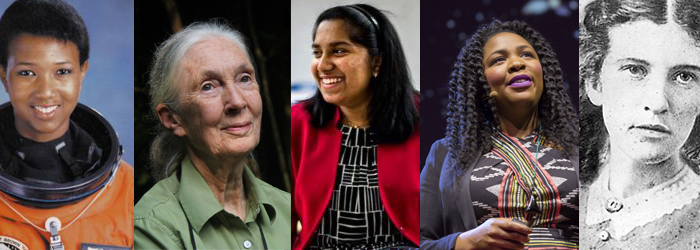5 POWERFUL WOMEN IN STEM YOU NEED TO KNOW
Good For All News - SCIENCE & TECHNOLOGY

BY OLIVIA COLOMBO ON MARCH 8, 2018
Stop! Look at the device you’re reading this on. Have you ever thought about how many people dedicated their lives to creating the computer code and programming that went into the technology you are using? Fun fact, the first person to ever create a computer program was a woman named Ada Lovelace, a scientist in the 1800s!
It’s Women’s History Month, and we want to share with you five women who have changed the course of history with their contributions to science, technology, engineering, and mathematics. Some of the largest discoveries in STEM today were made by women (Marie Curie & radioactivity, we’re looking at you!), despite that less than one-third (28.8%) of those employed in STEM are women.
FIVE WOMEN WHO HAVE CHANGED THE WORLD AND ARE SURE TO BE A SOURCE OF STEM-SPIRATION:
- POOJA CHANDRASHEKAR Young computer scientist & advocate.
Pooja is a senior at Harvard College, studying biomedical engineering, but in high school she was already changing the science scene by advocating for inclusion. As a high school sophomore, Pooja founded ProjectCSGIRLS, “an international youth-driven nonprofit working to close the tech gender gap.” ProjectCSGIRLS hosts all-women and girls computer science workshops and an annual tech competition for middle school girls. Several of our Roots & Shoots US National Leaders have had the inspiration and joy of working with Pooja on her gender gap-closing adventure, and through her personal STEM research and her advocacy for other young women, she is taking the tech world by storm.
- DR. JEDIDAH ISLER First African American woman to earn a PhD in Astrophysics from Yale
Astrophysicist Jedidah Isler is an award-winning researcher and TED fellow speaker, who advocates for women of colour in science. In 2014, she became the first African American woman to earn a PhD in astrophysics from Yale University. She completed a study about blazars, particle jets from the centre of supermassive, hyperactive black holes, which consume light thousands of times faster than an average black hole and can shoot out these particles at 99.99% of the speed of light. Now, she continues to study the origin of the energy from these powerful black holes, teaches, speaks about the importance of inclusiveness in STEM, and has even been invited to the White House.
- ELIZABETH BLACKWELL First woman in the United States to graduate medical school
Oftentimes seeing the suffering of another pushes us into action, as is the case with Elizabeth Blackwell when she heard her terminally ill friend wish for a female physician. Elizabeth was born in England in 1821, and then moved to the United States and worked as a teacher. She studied privately with doctors before she was accepted to Geneva Medical in New York, where she wasn’t taken seriously by faculty or students. She persevered and opened her own practice, where she initially struggled financially due to the prejudices of the day. With a few other female doctors, she established an infirmary for women and children, and went on to establish the U.S. Sanitary Commission of 1861 under Abraham Lincoln, to encourage sanitary conditions and health in war.
- MAE JEMISON First African American woman to travel to space
Born in 1956, Jemison is the first African American woman to travel to space. She spent her childhood in libraries, reading everything she could about astronomy. She studied chemical engineering at Stanford and then attended medical school at Cornell. After becoming a physician, she worked in Kenya, Cuba, and at a Cambodian refugee camp in Thailand. In 1985, she decided to pursue her dream and applied to the NASA astronaut training program. Though delayed by the Challenger devastation, she was selected the next year as one of 15 out of 2000 applicants. She then became the first African American woman in space as one of six astronauts on the Endeavour in 1992.
- DR. JANE GOODALL Ethologist, DBE, UN Messenger of Peace, Founder the Jane Goodall Institute
How could a list of impactful women in STEM be complete without Dr. Jane? From her courage to study wild chimpanzees in the forests of Tanzania at age 26 without any higher education or training (though she then went on to receive her PhD at Cambridge) , to her current work traveling around the world 300 days a year to spread her message of peace and sustainability, to her community-centred conservation organisation the Jane Goodall Institute and its international youth programme Roots & Shoots, and so much more, Dr. Jane is a role model for us all.
If you really want something, and work really hard, and take advantage of opportunities and never give up, you will find a way.